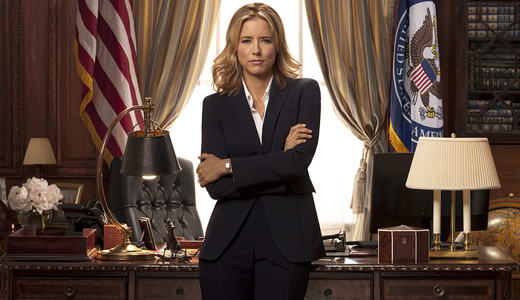Primetime television has never been a hoppin’ forum for realism.
Trust me on this: I grew up watching Fantasy Island. And while our television sets have since eschewed tropical-based dream fulfilment via a white-suited Ricardo Montalban, we still like to get away from it all via the tube. Our culture’s most popular, buzzy shows are populated with dragons and zombies, lawless bikers and superhuman doctors. Even our reality TV is outlandish. Hey, let’s face it: If we wanted real realism, we’d just go outside and sit on the front step for a while. We turn to television to escape reality. We flip on the telly and hope that some of our favorite characters will whisk us away to a world that’s better (or worse) than ours, filled with people and things we never—or, at least, hardly ever—see.
Including, apparently, a functional government.
Flip on the flat screen these days, and you’ll find scads of dramas giving viewers a supposed peek inside the Oval Office or a surreptitious stroll through the halls of Congress. House of Cards. Scandal. Homeland. Two new political dramas—State of Affairs (NBC) and Madam Secretary (CBS)—rolled out this fall with all the pomp of a political campaign.
Let’s not confuse the word “functioning” with “good” or “benevolent” here. Not many of these shows are ones we’d screen for new immigrants. Not a one of them contains much more than a whiff of Mr. Smith Goes to Washington. Many are brimming with lying, duplicitous, backstabbing and sometimes even murderous characters.
But, man, they sure get things done.
Oh, some of these shows suggest that our government is filled with a few Mr. Smith-like characters. Let’s just take Madam Secretary—a show that’s more aspirational and encouraging than some. CBS’ big freshman hit focuses on Elizabeth McCord (Tea Leoni), a soccer mom turned unorthodox Secretary of State. She is, naturally, brilliant: That’s a requisite in such shows. Her staff has its share of dysfunction, but all are trying to do the best job they know how.
 And boy, do they. Nearly every episode, it seems, they salvage the free world and America’s place in it via diplomacy, quick thinking and gut reactions. If Kim Jong Un had to talk with McCord on a regular basis, I think nuclear disarmament would be just around the corner.
And boy, do they. Nearly every episode, it seems, they salvage the free world and America’s place in it via diplomacy, quick thinking and gut reactions. If Kim Jong Un had to talk with McCord on a regular basis, I think nuclear disarmament would be just around the corner.
In State of Affairs, Katherine Heigl’s Charleston Tucker manages “the book” for the president of the United States—a daily-changing tome updating POTUS on the world’s biggest crises. Now, Tucker is no angel. In fact, she’s a heavy-drinking, promiscuous time bomb. But she knows how to do her job and, because she’s so good at it, the United States saves a doctor kidnapped by a terrorist organization—and in line for a beheading—just in the nick of time.
For audiences, I’m sure the rescue might’ve been cathartic, in a way, given how many beheadings have been in the news lately.
Netflix’ House of Cards is governmental television’s anti-Mr. Smith. The show is filled with terrible people doing terrible things, led by Mr. Terrible himself, Francis Underwood. He’d only save a doctor from terrorists if he could be assured of his vote in November (and those of his extended family besides).
And yet, in the midst of all the manipulation and duplicity and outright felonious behavior, we see that Underwood et al have power—real power—to effect real change (even if that change is primarily meant mainly to give them more power). The government in House of Cards is so underhanded that none of us want to imagine our own working like that … and yet we secretly marvel at its cutthroat rapidity and wonder whether Underwood’s regime might be, in its own dark way, an improvement over what can feel like Washington’s real-life muddling and waffling.
Well, maybe not all of us wonder that. But President Barack Obama does.
“I wish things were that ruthlessly efficient,” the First Fan of House of Cards told a handful of tech CEOs last year.
It seems to me that today’s political shows, be they aspirational or down-and-dirty, scratch the same itch that superhero stories can, or used to. Back in 1941, as the German Nazis were rolling across Europe, the first issue of Captain America featured ol’ Cap punching out Adolph Hitler on the cover. In 1978, when gas prices were going up and American affluence was going down and it seemed like our values were in retreat around the world, a clean-cut, cape-wearing guy named Superman flew into theaters and became a massive blockbuster.
When aspects of our society feel weak or dysfunctional, we long to see it strong and functional. And when we can’t get that feeling in real life, we turn to the fictional world—books, television and movies—to make it happen.
And if we’re feeling particularly cynical (as we are in this particular age of ours), we have trouble accepting aspirational heroes like Superman … but we still embrace the flawed-if-functional antihero: the scoundrel, the Underwood, who can get things done.






Recent Comments